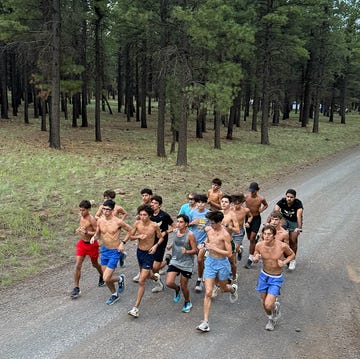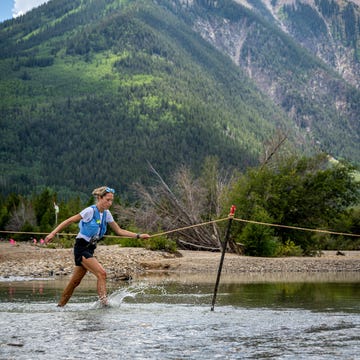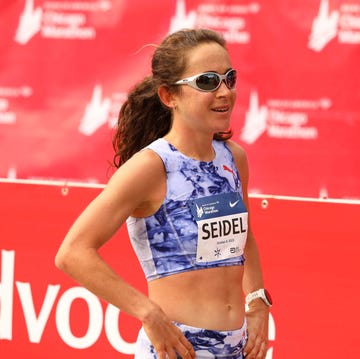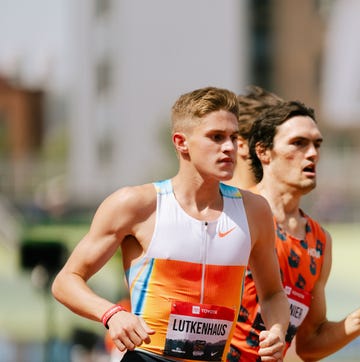After three men’s distance finals at the Olympic Games—the 1500 meters, the 3,000-meter steeplechase, and the 10,000 meters—the medal count doesn’t look even remotely like it did at past global championships.
Ethiopia, Great Britain, Kenya, Uganda, and Morocco each have one medal.
The United States has four.
No one could have predicted this, especially after the U.S. men went home medal-less after the past two World Championships—Eugene in 2022 and Budapest in 2023. At the Tokyo Olympics in 2021, the only medal winner for the American men was Paul Chelimo, who picked up a bronze in the 5,000 meters.
Now, only halfway through the six distance races at the Games, Grant Fisher pulled off a bronze in the 10,000 meters; Cole Hocker won gold in the 1500 meters and Yared Nuguse took the bronze, and Kenneth Rooks shocked everyone with his silver in the steeplechase. What’s behind the barrage of medals?
They had international experience and had been close before.
The years of futility weren’t completely futile. Instead, they gave the Americans insight on exactly what it took to get to the mountaintop. Fisher, in particular, had been close to the medals over three races during two past championships.
Nuguse was fifth in the 1500 in Budapest and was disappointed about it. Hocker was seventh in the same race. Rooks had been to Worlds in 2023 and made the final, finishing 10th.
As one American track official put it to Runner’s World, “They had touched the stove.”
They were already among the world’s best with their times.
In the 10,000 meters, Fisher has routinely run faster than 27 minutes. His American record of 26:33.84 from March 2022 makes him the ninth-fastest man in history. So, too, Nuguse, who scared Jakob Ingebrigtsen of Norway in the mile at the Diamond League final in 2023.
Nuguse’s 3:43.97 made him the fourth-fastest of all time in that event. So when Hocker beat Nuguse at the U.S. Olympic Trials in June, Hocker was beating one of the world’s best. Only Rooks, with a relatively modest steeplechase PR, made a big leap in getting on the podium at the Games. His competitors will never overlook him again, however.
When you’re already among the best in the world, it’s easier to imagine yourself medaling. All four men had been on the record saying they wanted a medal. “Sometimes, like when you’re going to bed, you think about moments like this,” Rooks said after winning his silver.
The training is so hard and exacting.
After suffering an injury in 2023 that knocked him out of the World Championships, Fisher decided to leave the Bowerman Track Club and return to his high school coach, Mike Scannell. All of the training Scannell writes is geared toward Fisher and Fisher alone. “It’s a study of one,” Scannell told Runner’s World. Scannell and Fisher incorporate lactate testing into Fisher’s hard workouts. Scannell will take small samples of Fisher’s blood several times during a workout and make on-the-fly adjustments to the interval paces Fisher is running, sometimes as small as 1 second per 400 meters.
Hocker followed his college coach from Eugene, Oregon, to Blacksburg, Virginia, last year. There, Hocker runs in a small pro group with former Oregon teammate Cooper Teare. Rooks stayed with Ed Eyestone, the college coach who coached him to an NCAA title at BYU. Nuguse trains in a larger group, the On Athletics Club, under Dathan Ritzenhein.
“From Yared’s workouts, I knew he was as fit as he’s ever been,” Ritzehein said on August 4 outside of Stade de France after the 1500. “We knew he was in a good spot.”
They raced boldly.
When Ingebrigtsen took the 1500 meters out at breakneck pace, Hocker hung in there. “I told myself, ‘Just don’t be soft—you got to go with it,’” he said. “‘You’re going to regret this for the rest of your life if you don’t go with it.’” By being tough through the middle, Hocker was in position at the end to use his devastating kick and grab the gold.
Fisher’s race plan was to keep himself within medal position—or at least close to it—the entire race. When he was momentarily jostled into the rail with nine laps to go, he wasn’t pleased. “I spent a whole race defending a position and to have it go like that—it doesn’t feel great,” he said. He was able to recover and work his way back up to the top three, but his words show what his mindset was. He was “defending a position.” He stuck himself in it.
For bold racing, nothing beats Rooks’s hard move to the front with 350 meters remaining in the race. Suddenly an unknown American had put 5 meters on the defending Olympic champion and the world record holder. Rooks’s tactics instilled “a bit of panic” in the favorites, Eyestone said, and he got emotional on the phone as he described Rooks’s move, his voice catching several times. (“He’s a big softy,” Rooks said about his coach after the medal ceremony.)
Off the final water jump, the eventual champion Soufiane El Bakkali of Morocco caught up to Rooks, as did Abraham Kibiwot of Kenya. Rooks took a look behind him and realized he had a medal sewn up—the rest of the field was well behind after a hard fall off the final barrier by the world record holder, Lamecha Girma.
But Rooks kept fighting and didn’t settle for bronze; he held off Kibiwot. “I was just as proud of his move to hold on to silver as I was his big power move,” Eyestone said. Rooks is the first medalist Eyestone has coached.
They inspired one another.
Fisher’s medal started it off, on the first night of track in Paris. His compatriots were watching and taking heart. Nuguse described watching the race in the Olympic Village with several others and screaming at the television during the final lap. But it certainly plants the seed: If he can do it, so can I.
With three distance races left to come in Paris—the 800 meters, the 5,000 meters, and the marathon—might the Stars and Stripes be raised yet again in Paris?
“I was just so itching to get out to the track, seeing those guys get the medal,” said 800-meter runner Bryce Hoppel after his first-round race. “Seeing Hocker get a gold. It’s incredible. It’s my turn now, and hopefully I can do the same and make the U.S. proud and keep those medals rolling.”
Hoppel, indeed, is into the 800-meter final on August 10.
Editor’s note: A previous version of this story credited Paul Chelimo with winning a silver medal in 2021. It was a bronze medal.

Sarah Lorge Butler is a writer and editor living in Eugene, Oregon, and her stories about the sport, its trends, and fascinating individuals have appeared in Runner’s World since 2005. She is the author of two popular fitness books, Run Your Butt Off! and Walk Your Butt Off!

















